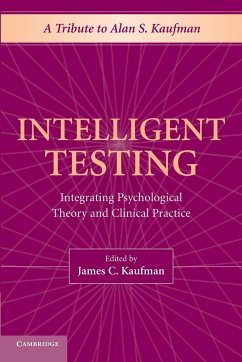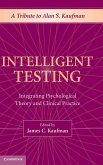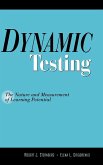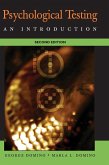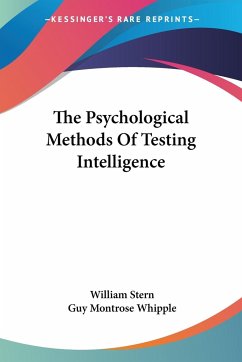Intelligent Testing
Integrating Psychological Theory and Clinical Practice
Herausgeber: Kaufman, James C.
Intelligent Testing
Integrating Psychological Theory and Clinical Practice
Herausgeber: Kaufman, James C.
- Broschiertes Buch
- Merkliste
- Auf die Merkliste
- Bewerten Bewerten
- Teilen
- Produkt teilen
- Produkterinnerung
- Produkterinnerung
This tribute to Alan S. Kaufman is edited by his son James, with contributions by a 'who's who' in IQ testing.
Andere Kunden interessierten sich auch für
![Intelligent Testing Intelligent Testing]() Intelligent Testing100,99 €
Intelligent Testing100,99 €![Dynamic Testing Dynamic Testing]() Robert J. SternbergDynamic Testing113,99 €
Robert J. SternbergDynamic Testing113,99 €![Psychological Testing Psychological Testing]() George DominoPsychological Testing126,99 €
George DominoPsychological Testing126,99 €![On Being Intelligent On Being Intelligent]() Ashley MontaguOn Being Intelligent91,99 €
Ashley MontaguOn Being Intelligent91,99 €![Psychological Testing of American Minorities Psychological Testing of American Minorities]() Ronald J. SamudaPsychological Testing of American Minorities135,99 €
Ronald J. SamudaPsychological Testing of American Minorities135,99 €![Assessing Sex Bias in Testing Assessing Sex Bias in Testing]() Paula SelkowAssessing Sex Bias in Testing101,99 €
Paula SelkowAssessing Sex Bias in Testing101,99 €![The Psychological Methods Of Testing Intelligence The Psychological Methods Of Testing Intelligence]() William SternThe Psychological Methods Of Testing Intelligence17,99 €
William SternThe Psychological Methods Of Testing Intelligence17,99 €-
-
-
This tribute to Alan S. Kaufman is edited by his son James, with contributions by a 'who's who' in IQ testing.
Hinweis: Dieser Artikel kann nur an eine deutsche Lieferadresse ausgeliefert werden.
Hinweis: Dieser Artikel kann nur an eine deutsche Lieferadresse ausgeliefert werden.
Produktdetails
- Produktdetails
- Verlag: Cambridge University Press
- Seitenzahl: 264
- Erscheinungstermin: 14. Mai 2014
- Englisch
- Abmessung: 229mm x 152mm x 14mm
- Gewicht: 388g
- ISBN-13: 9781107423558
- ISBN-10: 1107423554
- Artikelnr.: 41452432
- Herstellerkennzeichnung
- Libri GmbH
- Europaallee 1
- 36244 Bad Hersfeld
- gpsr@libri.de
- Verlag: Cambridge University Press
- Seitenzahl: 264
- Erscheinungstermin: 14. Mai 2014
- Englisch
- Abmessung: 229mm x 152mm x 14mm
- Gewicht: 388g
- ISBN-13: 9781107423558
- ISBN-10: 1107423554
- Artikelnr.: 41452432
- Herstellerkennzeichnung
- Libri GmbH
- Europaallee 1
- 36244 Bad Hersfeld
- gpsr@libri.de
Part I. Those Who Know Him: 1. Alan S. Kaufman's contributions Nadeen L.
Kaufman; 2. Who is Alan S. Kaufman? Elizabeth O. Lichtenberger; 3. Alan S.
Kaufman: the man and the professional Jennie Kaufman Singer; Part II.
Intelligent Testing: 4. Intelligent testing: bridging the gap between
Classical and Romantic science in assessment Elaine Fletcher-Janzen; 5. The
intelligent testing of children with specific learning disabilities Nancy
Mather; 6. Temperament preferences for children ages 8 through 17 in a
nationally represented sample Kyle Bassett and Thomas Oakland; 7.
Intelligent intelligence testing: the influence of Alan S. Kaufman Jack A.
Naglieri; Part III. The Intersection of Theory and Measurement: 8. Kaufman
on theory, measurement, interpretation, and fairness: a legacy in training,
practice, and research Samuel O. Ortiz and Dawn P. Flanagan; 9. The theory
of successful intelligence as a basis for new forms of ability testing at
the high school, college, and graduate school levels Robert J. Sternberg;
10. Kaufman's work in the penumbra between measurement science and clinical
assessment Randy W. Kamphaus and Cecil R. Reynolds; 11. Success is a latent
variable: how Alan Kaufman shaped intelligence test theory, interpretation,
and psychometrics with factor analysis Jason C. Cole; Part IV. Kaufman
Across the World: 12. The K-ABC in France Claire Énéa-Drapeau and Michèle
Carlier; 13. Dr. Alan Kaufman's contribution to Japan: K-ABC, intelligent
testing, and school psychology Toshinori Ishikuma; 14. Alan Kaufman's deep
influence in Sweden Jan Alm; 15. Intelligent testing of underserved
populations R. Steve McCallum and Bruce A. Bracken.
Kaufman; 2. Who is Alan S. Kaufman? Elizabeth O. Lichtenberger; 3. Alan S.
Kaufman: the man and the professional Jennie Kaufman Singer; Part II.
Intelligent Testing: 4. Intelligent testing: bridging the gap between
Classical and Romantic science in assessment Elaine Fletcher-Janzen; 5. The
intelligent testing of children with specific learning disabilities Nancy
Mather; 6. Temperament preferences for children ages 8 through 17 in a
nationally represented sample Kyle Bassett and Thomas Oakland; 7.
Intelligent intelligence testing: the influence of Alan S. Kaufman Jack A.
Naglieri; Part III. The Intersection of Theory and Measurement: 8. Kaufman
on theory, measurement, interpretation, and fairness: a legacy in training,
practice, and research Samuel O. Ortiz and Dawn P. Flanagan; 9. The theory
of successful intelligence as a basis for new forms of ability testing at
the high school, college, and graduate school levels Robert J. Sternberg;
10. Kaufman's work in the penumbra between measurement science and clinical
assessment Randy W. Kamphaus and Cecil R. Reynolds; 11. Success is a latent
variable: how Alan Kaufman shaped intelligence test theory, interpretation,
and psychometrics with factor analysis Jason C. Cole; Part IV. Kaufman
Across the World: 12. The K-ABC in France Claire Énéa-Drapeau and Michèle
Carlier; 13. Dr. Alan Kaufman's contribution to Japan: K-ABC, intelligent
testing, and school psychology Toshinori Ishikuma; 14. Alan Kaufman's deep
influence in Sweden Jan Alm; 15. Intelligent testing of underserved
populations R. Steve McCallum and Bruce A. Bracken.
Part I. Those Who Know Him: 1. Alan S. Kaufman's contributions Nadeen L.
Kaufman; 2. Who is Alan S. Kaufman? Elizabeth O. Lichtenberger; 3. Alan S.
Kaufman: the man and the professional Jennie Kaufman Singer; Part II.
Intelligent Testing: 4. Intelligent testing: bridging the gap between
Classical and Romantic science in assessment Elaine Fletcher-Janzen; 5. The
intelligent testing of children with specific learning disabilities Nancy
Mather; 6. Temperament preferences for children ages 8 through 17 in a
nationally represented sample Kyle Bassett and Thomas Oakland; 7.
Intelligent intelligence testing: the influence of Alan S. Kaufman Jack A.
Naglieri; Part III. The Intersection of Theory and Measurement: 8. Kaufman
on theory, measurement, interpretation, and fairness: a legacy in training,
practice, and research Samuel O. Ortiz and Dawn P. Flanagan; 9. The theory
of successful intelligence as a basis for new forms of ability testing at
the high school, college, and graduate school levels Robert J. Sternberg;
10. Kaufman's work in the penumbra between measurement science and clinical
assessment Randy W. Kamphaus and Cecil R. Reynolds; 11. Success is a latent
variable: how Alan Kaufman shaped intelligence test theory, interpretation,
and psychometrics with factor analysis Jason C. Cole; Part IV. Kaufman
Across the World: 12. The K-ABC in France Claire Énéa-Drapeau and Michèle
Carlier; 13. Dr. Alan Kaufman's contribution to Japan: K-ABC, intelligent
testing, and school psychology Toshinori Ishikuma; 14. Alan Kaufman's deep
influence in Sweden Jan Alm; 15. Intelligent testing of underserved
populations R. Steve McCallum and Bruce A. Bracken.
Kaufman; 2. Who is Alan S. Kaufman? Elizabeth O. Lichtenberger; 3. Alan S.
Kaufman: the man and the professional Jennie Kaufman Singer; Part II.
Intelligent Testing: 4. Intelligent testing: bridging the gap between
Classical and Romantic science in assessment Elaine Fletcher-Janzen; 5. The
intelligent testing of children with specific learning disabilities Nancy
Mather; 6. Temperament preferences for children ages 8 through 17 in a
nationally represented sample Kyle Bassett and Thomas Oakland; 7.
Intelligent intelligence testing: the influence of Alan S. Kaufman Jack A.
Naglieri; Part III. The Intersection of Theory and Measurement: 8. Kaufman
on theory, measurement, interpretation, and fairness: a legacy in training,
practice, and research Samuel O. Ortiz and Dawn P. Flanagan; 9. The theory
of successful intelligence as a basis for new forms of ability testing at
the high school, college, and graduate school levels Robert J. Sternberg;
10. Kaufman's work in the penumbra between measurement science and clinical
assessment Randy W. Kamphaus and Cecil R. Reynolds; 11. Success is a latent
variable: how Alan Kaufman shaped intelligence test theory, interpretation,
and psychometrics with factor analysis Jason C. Cole; Part IV. Kaufman
Across the World: 12. The K-ABC in France Claire Énéa-Drapeau and Michèle
Carlier; 13. Dr. Alan Kaufman's contribution to Japan: K-ABC, intelligent
testing, and school psychology Toshinori Ishikuma; 14. Alan Kaufman's deep
influence in Sweden Jan Alm; 15. Intelligent testing of underserved
populations R. Steve McCallum and Bruce A. Bracken.

